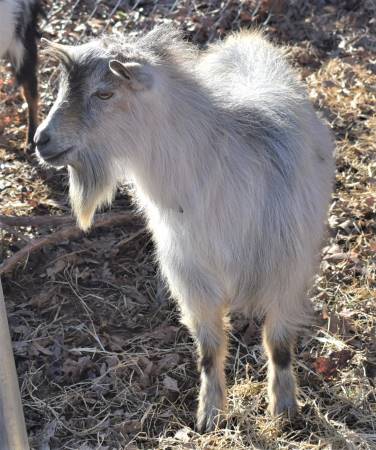Urinary Calculi Bucks & Wethers
Urinary Calculi
Urinary Calculi, is a urinary-tract condition in goats and sheep, which prevents both urination and breeding in males. The twists and turns of the male urethra make passing solid particles difficult at best and impossible at worst. Urinary Calculi is a disease that can and does kill bucks and wethers quickly.
Why Does It Occur: Urinary calculi in goats and sheep is a common and mostly preventable livestock health issue. Other names for this condition are urolithiasis and water belly. When grain is heavily fed, forage is limited and minerals are out of balance, the perfect scenario is set up for stones and blockage to form in the urethra. The stones may be big enough to completely block the urethra or still allow a trickle of urine to pass through. Urinary Calculi is almost always the result of improper feeding by the producer. Proper calcium to phosphorus ratio in feed, hay and minerals is critical; this ratio should be 2 1/2 to 1. Although the disease is called Urinary Calculi, the real culprit is phosphorus -- specifically too much phosphorus in relation to the amount of calcium in the diet. Feeding too much concentrated feed and/or feeding concentrates with an improper calcium-to-phosphorus ratio is a major cause of Urinary Calculi. Overfeeding or improper feeding of concentrates causes solid particles to develop in the urine; these solid particles block the flow of urine out of the goat's body, causing great pain, discomfort and oftentimes death.
- Another risk factor is Lack of Water or dirty water: Insufficient or dirty water leads to decreased intake which can concentrate urine and increase the likelihood of crystal formation.
How to Prevent: diet is absolutely critical to help avoid Urinary Calculi. The wether & buck’s grain contains ammonium chloride which is the most important ingredient to ensure urinary tract health. It helps prevent and break up urine crystals. So make sure your male goats are getting a feed that has ammonium chloride in it. If not, buy the powdered ammonium chloride and add a pinch to each ration of grain each day. Do not give too much or damage will result. But this alone is no guarantee that Urinary Calculi will be avoided. Be very careful NOT to give more than 1 cup of grain per day to bucks/wethers. Do not feed Alfalfa to them either.
My Vet cautioned me against feeding alfalfa in any form, hay or pellet. Why? Alfalfa hay especially, is high in calcium and protein, which can lead to the formation of urinary calculi in male goatsl
The calcium in alfalfa hay can cause the pH of the urine to become more alkaline which can lead to the formation of urinary calculi.
It is very important to understand that feeding alfalfa hay or alfalfa pellets to male goats is not recommended at all.
-
Clarifying the Cause:Urinary calculi, also known as uroliths, are mineral deposits that form in the urinary tract. In goats, they are most commonly composed of calcium carbonate or struvite, which is an ammonium and magnesium phosphate crystal. These stones are more common in castrated male goats (wethers) but can occur with intact bucks if fed high-concentrate diets, which can lead to imbalances in calcium and phosphate, then Urinary Calculi.
Symptoms- How Do I Know If It's Urinary Calculi? Symptoms of Urinary Calculi include tail twitching in males, restlessness, anxiety and a "hunched-up" body posture as the animal strains to urinate. Catch it early! If your buck or wether does not come to be fed as usual and if you see them straining to pee, it's likely Urinary Calculi. Treatment must begin immediately.
UC Davis, College of Vet Medicine notes that confirming a diagnosis is as simple (yet costly & somewhat time consuming in a critical situation) as a physical examination and additional testing including bloodwork, X-rays, and an ultrasound. These tests help confirm that your buck or wether has a urinary obstruction due to bladder stones, and systemic compromise including electrolyte changes and increased kidney values consistent with not being able to urinate.
Some Vets will treat your goat urgently to stabilize him and provide urinary diversion (a way for urine to flow out of the body), by placing a tube through his skin and abdomen into his bladder to allow temporary urinary drainage. They may also surgically amputate his urethral process or pizzle as it is called (small, narrow appendage at the end of the penis where stones often lodge), allowing for a larger urethral opening.
The diagnostic tests results will show if the stones are consistent with struvite type stones, which can sometimes be dissolved with medical treatment. Your Vet may give IV fluids, muscle relaxants, pain medication, and urinary acidification to dissolve the stones, and antibiotics to prevent infection of the bladder. Fortunately, sometimes this process clears his stones, and he is able to urinate normally once again.
What if you can not afford all of that expense?
Treatment: With the assistance of my Vet I personally have developed a treatment that has worked both times this happened to a male goat at my farm.
- Key: Catch it immediately!
- Do not force an animal with Urinary Calculi to drink lots of water; if fluids can't leave the body because the exit is blocked, the only alternative is for the bladder to burst. A burst bladder cannot be fixed and is fatal.
- Those crystals must be dissolved for the goat to be able to pee.
- I mix 1 tsp. of powdered ammonium chloride + 1 capsule (opened and emptied into mix) of a TRIPLE ACTION FORMULA Nutrient which I purchase on Amazon called
Wiseceutical Chanca Piedra & Hydrangea. This Supplement also contains Dandelion Root and is a Natural Kidney & Gallbladder Formula and considered an effective Stone Breaker, Flushes Impurities, Cleanses the Urinary Tract - and is Enhanced with BioPerine. Following is the blue & yellow link to purchase from Amazon (#CommissionsEarned): https://amzn.to/4k2Ly6MMax Strength Chanca Piedra, Hydrangea & Dandelion Root - Natural Kidney & Gallbladder Formula - Stone Breaker, Flush Impurities, Cleanse Urinary Tract - Enhanced with BioPerine. 60 Veggie Capsules. And additionally now you can add one dropper full of this product which you may purchase from Amazon (#CommissionsEarned) by clicking on this blue & yellow link: https://amzn.to/4iUnFxc
Wild & Organic Chanca Piedra Stone Breaker Drops - Herbal Chanca Piedra Extract for Kidney, Gallbladder Cleanse & Urinary Support - Vegan, Sugar & Alcohol-Free Tincture - 4 fl oz
Mix the ammonium chloride & 1 opened Supplement Capsule and 1 chewable baby aspirin crushed with 1/8th of a cup of water or less (just enough water to dissolve ammonium chloride & Supplement & aspirin) and add the dropper of Chanca Tincture drops to fill a 6 ml syringe with this mixture. Administer 3 times for 2-3 days or until goat is back to normal eating and drinking and hanging out with the herd. - Note: if the condition is severe or not improving by day 2, I additionally mix 1 tsp ammonium chloride and 1 capsule opened of Supplement with peanut butter & flour & 1 baby aspirin crushed and give like a bolus.
- Clipping the Pizzle: Clipping or removing the pizzle (the urethral process) in goats, particularly for treating urinary calculi (stones), carries risks. These include potential for infection, urethral complications, and a higher risk of future stone formation. My Vet advised against it as it is not always a successful procedure and my goats recovered fine without it.
Going Forward:
- Acidifiers: Adding ammonium chloride to the diet can help lower urine pH, making it less conducive to stone formation. I add 1 pinch of UltraCruz ammonium chloride to each mornings 2 cup buck/wether pellet ration, the rest of their life. Click on the following blue & yellow link (#CommissionsEarned) to purchase from Amazon: https://amzn.to/4de9H8q
UltraCruz Goat & Sheep Ammonium Chloride, 2.5 lb
Important! Please Read The Following Notice!
All information provided in these articles is based either on personal experience or information provided by others whose treatments and practices have been discussed fully with a vet for accuracy and effectiveness before passing them on to readers. Much of my page content is from Veterinary Colleges and Manuals.
In all cases, it is your personal responsibility to obtain veterinary services and advice before using any of the information provided in these articles. JoAnna Mertz is not a veterinarian. Neither JoAnna Mertz nor applejofarms.com nor any of the contributors to this website will be held responsible for the use of any information contained herein.



Powered by Boutique Store Builder . Web Design by Avalon Rose Design.


